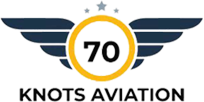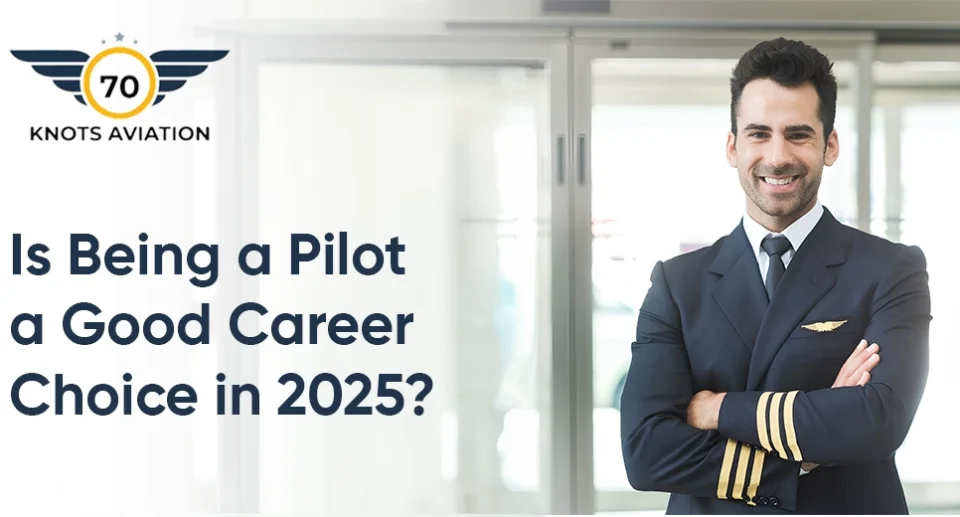Best Flight Training Institutes in India for Beginners

Being a pilot requires accuracy, accountability, and a strong knowledge of aviation. Whether you wish to fly as a private or commercial pilot, it all begins with quality training. Our instructors at 70 Knots Aviation are developing the next generation of pilots who will be ready to face the challenges of the world. This blog provides insight into flight theory, flying lessons, pilot licensing, and career development.
From Ground School to the Sky: How Pilots Are Trained
It is not just about flying; an aviator must ultimately understand everything about aviation, i.e. weather patterns, mechanics of the flight, etc. Here’s how pilot training typically unfolds:
- Ground School: This is where the theory begins. Aspiring pilots are introduced to the fundamentals of aviation, safety procedures, and regulatory guidelines.
- Flight Simulation Training: Before hitting the actual cockpit, students practice on simulators that replicate real-world flying conditions.
- Flight Hours & Practical Training: Under the supervision of certified flight instructors, students accumulate actual flying experience, sharpening their skills in real aircraft.
- Testing & Licensing: Pilots need to pass DGCA (Directorate General of Civil Aviation) tests to earn their flying license.
The Blueprint of a Pilot: Subjects and Skills Taught in Aviation Schools
Becoming a pilot isn’t just about flying; it’s about mastering the science, skills, and decision-making needed for safe and efficient aviation.
Aviation Theory & Ground School
Before stepping into the cockpit, pilots must undergo extensive training in aviation theory. Flight schools instruct pilots in basic subjects such as aerodynamics, so pilots know how the aircraft flies through the air, and meteorology, so pilots know how flying changes through changing weather conditions. Air navigation is another key area of study, which concerns how efficiently to plan flight routes, while aviation laws teach the students the legal obligations of each pilot.
Flight Simulations
Technology is an integral part of pilot training today. Advanced flight simulators allow students to experience real-world flying scenarios while never leaving the ground. Simulators prepare students to practice take-offs, landings, and emergency procedures in real-time, all while honing students’ decision skills. At 70 Knots Aviation, our advanced flight simulators prepare you for every possible in-flight scenario to make you feel comfortable when in control of a plane.
Real Flight Training
After students finish both their ground school training and simulator training, the time has finally arrived for them to fly an actual aircraft. They will receive flight time with certified flight instructors, practicing takeoff and landing, and performing different procedures in a flight. This is possibly the most important part of their training, since it enables students to apply what they have learned in theory.
Air Traffic Communication
Pilots must be competent communicators when talking with Air Traffic Control (ATC) so that flights are flown as safely and smoothly as possible. Training includes everything from the standard procedures of radio communication, the terminology of aviation, and the procedures for communicating during an emergency. Flight schools train students to become accustomed to radio transmission standards, which helps students become familiar with working in the air.
Emergency Procedures & Safety Training
Pilots have to be prepared for anything. In flight school, students learn to handle in-flight emergencies like engine loss, system failures, and sudden weather changes. Being prepared during an emergency may mean the difference between a successful landing and disaster. It is for this reason that we at 70 Knots Aviation focus on practical emergency training. Through the intense practice of emergency procedures, the student is taught to make quick and informed decisions to save lives.
Regulatory Exams & Licensing Preparation
In India, you must obtain a license from the DGCA to fly an aircraft legally. These exams test knowledge in subjects like air navigation, meteorology, aviation regulations, and technical aspects of aircraft. The common types of licenses include:
- Student Pilot License (SPL): The first step in the journey.
- Private Pilot License (PPL): Fly privately but not commercially.
- Commercial Pilot License (CPL): The important license to fly for a living.
Navigating Your Pilot Journey: Exams, Licenses, and Career Growth
The aviation sector is always changing, and a pilot’s path is just beginning when they obtain a license. Possible advancement opportunities include First Officer in an airline, upgrading to Captain with enough flight time, flying cargo or corporate aviation, and flying internationally. Training schools with strong industry connections, such as 70 Knots Aviation, help students explore these career paths effectively.
More Than Just Flying: Key Lessons Every Aspiring Pilot Must Learn
In addition to the basics of aircraft operation, pilots must also develop other essential operations. One of the most essential skill sets regarding flying is decision-making. Pilots frequently have to respond to high-pressure situations that require instantaneous decisions. Further, knowledge and understanding of aviation law are crucial as pilots are obliged to comply with regulations throughout their careers.
Why 70 Knots Aviation is Your Best Co-Pilot in This Journey
When selecting a flight school, the school’s image and the quality of your training are important. At 70 Knots Aviation, students are taught by instructors with years of real-world flying experience, state-of-the-art flight simulators during training, full preparation for DGCA exams, and a solid aviation network to assist students with their careers. We don’t simply teach you how to fly; we prepare you for an aviation career for life. Whether you want to fly in commercial or private aviation, our goal at 70 Knots Aviation is to help you achieve your dreams.
Conclusion
Becoming a pilot is a long, difficult, but rewarding accomplishment. Choosing the right flying school will help you learn the skills, knowledge, and maintain the correct mindset to fly. Selecting a flight school like 70 Knots Aviation will promise world-class training, mentorship, and a clear pathway toward a successful aviation career. Your adventure of flying begins with proper training, let 70 Knots Aviation be your launching pad to the skies!





